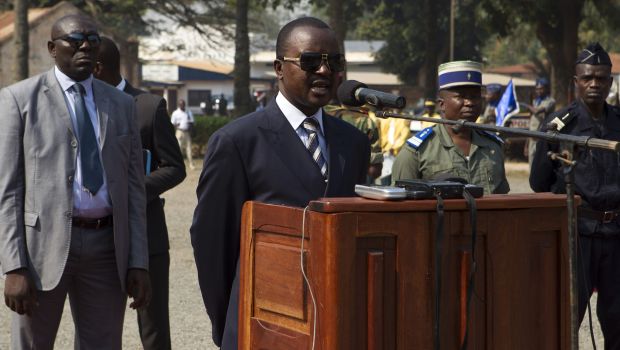
Alexandre-Ferdinand Nguendet, the head of the Central African Republic’s (CAR) transitional assembly, gives a speech at the Gendarmerie headquarters in Bangui, January 13, 2014. (REUTERS/Siegfried Modola)
Bangui, Central African Republic, AP—The interim leader of the Central African Republic vowed on Monday that the era of anarchy in the tumultuous country was now over, a bold declaration made only days after the man who had seized power in a coup last year stepped down from power under international pressure.
Alexandre-Ferdinand Nguendet heads the National Transition Council (NTC) that will now select a new interim president for the country by the end of next week. The council is due to convene on Tuesday to begin the work of replacing Michel Djotodia, the rebel leader and interim president who resigned on Friday.
Djotodia came under mounting international criticism after his government failed to stem unprecedented levels of violence between the country’s Christian and Muslim communities. More than 1,000 people were killed in December alone, and the fighting prompted nearly one million people to flee their homes.
“The pillaging and the chaos are over,” Nguendet told police officers on Monday while encouraging them to retake their posts. “I’m calling for your help in re-establishing security across all of the Central African Republic.”
Last year’s coup plunged the deeply impoverished country into a state of near-anarchy, where the top rebel leaders who took over the government exerted little control over their fighters in the streets. Many of the security forces loyal to ousted President Francois Bozize fled, leaving the rebels in charge of Bangui.
A rapid intervention team made up of 400 officers was put in place on Monday and will work alongside the French troops and African peacekeepers, Nguendet said.
However, the forces face an enormous task in securing a city where more than 500,000 people have fled their homes in fear including 100,000 living in and around the airport guarded by French troops. While Djotodia’s departure was met with jubilation in the streets, retaliatory violence continues.
The Central African Republic’s woes began as a political crisis but the conflict turned sectarian as resentment grew towards Djotodia’s mostly Muslim fighters in this predominantly Christian country. As Djotodia’s rule crumbled, Christian militias began hunting down and killing those they accused of collaborating with the Muslim fighters who had killed, raped and robbed civilians.
The NTC rubber-stamped Djotodia’s leadership last year after he seized power, and now faces the task of choosing someone who can guide the country towards elections that are scheduled to be held before the end of the year. Already, though, there are doubts about how that can take place given that voter rolls and administrative buildings across the country were looted and destroyed during the rebellion.
